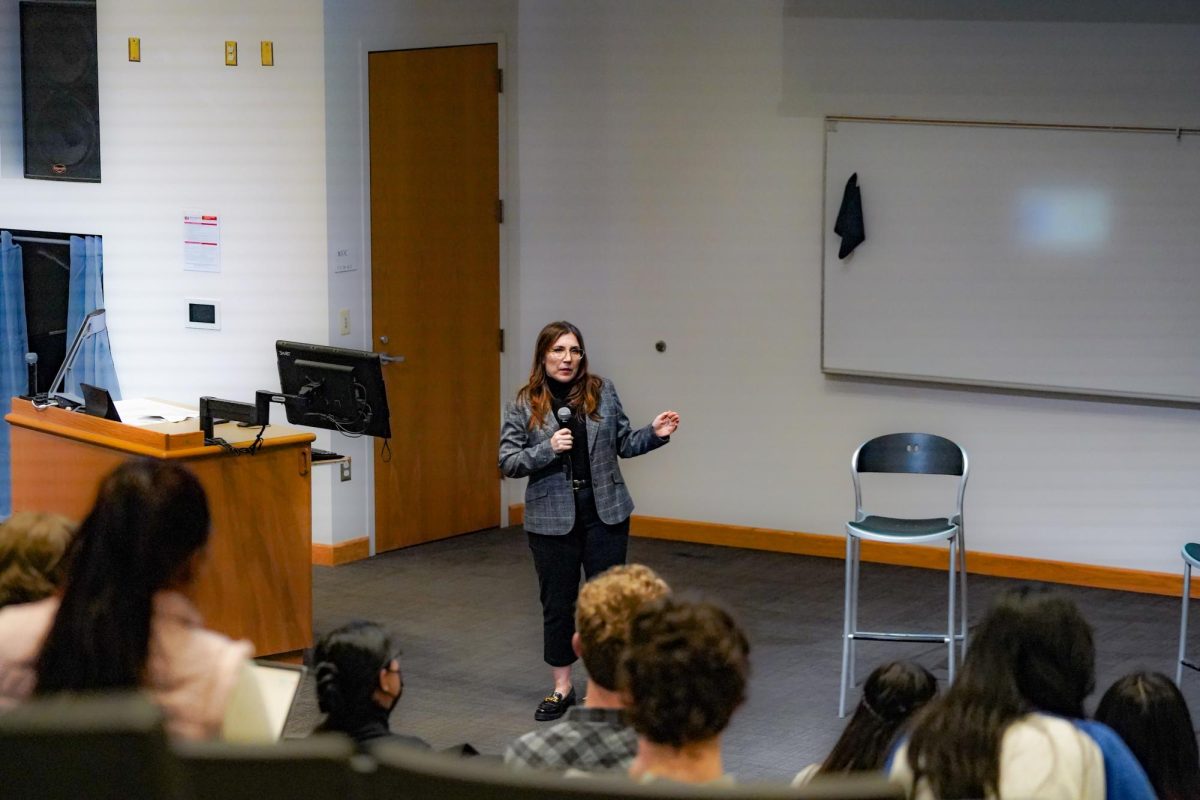Whitworth’s philosophy department, the smallest on campus, gained students in last five years
“Small, but curiously powerful” is how philosophy department chair and professor Forrest Baird describes Whitworth’s philosophy department.
The department used to be a part of the religion and philosophy department, which split in 2008 to form the separate theology and philosophy departments.
Philosophy is the smallest department on campus, said Gary Whisenand, director of Institutional Research.
There are only four professors, but senior philosophy major David Whisenand said they are some of the best on campus.
“The professors are one of the best parts of philosophy,” David Whisenand said. “They are all unique and bring different things. They really work with students and really engage with them.”
Most of the 26 philosophy majors are male, with 18 male majors and eight female majors as of fall 2012. Philosophy is one of the few majors in which male students outnumber female students, Gary Whisenand said.
There are no freshmen philosophy majors and only one freshman philosophy minor as of Fall 2012. Baird said almost all of the philosophy majors were converted from other majors.
“Very few people come in to college expecting to study anything more than Intro to Philosophy,” he said. “We have to be recruiting all the time.”
For junior Rebecca Southwick, it all started sophomore year. She took two classes taught by Baird: C.S. Lewis and Logic.
“Those are my two favorite classes. I thought maybe I should study this more,” she said. “C. S. Lewis met me where I was at.”
After class one day, Forrest suggested she consider majoring in philosophy. She said she felt it fit her skills, since she enjoys deep philosophical thinking.
“The major paints a picture of philosophical thought throughout the ages and I want to see how it pans out,” Southwick said.
With only 44 Whitworth philosophy majors and minors combined, a large number of students in philosophy courses are from outside of the department.
Rebecca Korf, a junior science major, is taking a philosophy class on logic this semester.
“The professors try really hard to make these ideas accessible,” Korf said. “They are really open to people who are not majoring in philosophy.”
Before coming to Whitworth, Korf said she had almost no philosophy experience.
“I saw it as a thing old people did in an armchair by the fireplace,” Korf said.
After taking the ethics class, a required course for pharmacy, she decided to take more.
“I am taking philosophy classes because they are challenging in a way that I don’t get in my science classes,” Korf said. “Those answers I can get in a textbook or [search on] Google. With ethics, you can’t just search ‘How should we live?’”
Philosophy is important because it influences the way the world functions, Korf said.
“The ideas of philosophy have a huge influence,” she said. “Logic provides the basis for math. Different ethical theories have affected how history plays out. These ideas affect how we are living today whether or not we realize it.”
Those ideas are explored in philosophy classes. Other departments, such as math, focus on one exact way of doing things. Philosophy is more open to exploring options, including unpopular views, David Whisenand said.
Combining a real Christian commitment with intellectual openness, the philosophy department has five main goals, said Baird. Two of those goals are critical thinking and constructive synthesis.
“Often philosophy is seen as tearing things apart,” Baird said. “We think it is important to put things back together, too. We want to do both. The critical thinking tears apart and the constructive synthesis builds up.”
One virtue of the philosophy department is valuing the ability to think critically, even when you are passionate about the other side, David Whisenand said.
“I can honestly say studying philosophy has changed me as a person,” he said. “The virtues of the philosophy department are important and lasting.”
Debunking misconceptions
Misconception: A philosophy degree is not helpful in getting a job.
Some potential fields a philosophy degree can lead to are business, social services and politics, according the department website. A philosophy degree is helpful for graduate schools of law, theology, education, business administration and medicine.
“Philosophy as a major has prepared me for lots of options,” David Whisenand said. “It does lead into a career, but often requires a graduate degree. It makes you a better person, that would have to count for something.”
Misconception: Some people think philosophers only play with ideas and constantly change their positions.
“They mistakenly think that we don’t care about the ideas,” David Whisenand said. “What we are really doing is exploring ideas to develop them more fully.”
Misconception: Philosophy overlaps with the Core classes.
“It isn’t just Core,” Whisenand said. “It’s exploring different issues in a different light.”
Misconception: Philosophy only helps with studying philosophical works.
“Having good critical thinking skills and learning how to pick apart an argument and see if it is logically coherent helps you with thinking and analyzing other things besides philosophy,” Southwick said.
Misconception: Philosophy does not discuss faith.
“A lot of people think philosophy is about exploring things, but not talking about faith. As philosophers, we think of it as something that helps,” Whisenand said. “As we understand philosophy, we understand what we think better. I think that they can be mutually informative.”
Contact Madison Garner at mgarner16@my.whitworth.edu







 Spokane?
Spokane?